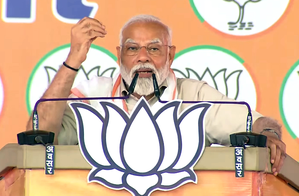New Delhi, Global credit rating agency Fitch on Tuesday slashed its FY-21 GDP growth forecast for India further downward to (-) 10.5 per cent from (-) 5 per cent.
“We expect the shortfall of activity relative to our pre-virus forecast to be 16 per cent by early 2022,” Fitch Ratings said in its latest Global Economic Outlook (GEO) for September.
Consequently, the revisions have also impacted the 2020 GDP forecasts for emerging markets (EM), excluding China, which declined further to (-) 5.7 per cent from (-) 4.7 per cent.
“The latter primarily reflects a huge change in our Indian forecast for the fiscal year — ending March 2021 (FY-21) to (-) 10.5 per cent from (-) 5 per cent,” the September GEO said.
The agency expects global GDP to fall by 4.4 per cent in 2020.
Recently, India recorded one of the sharpest GDP contractions in the world in 2Q20 (second quarter) or 1Q (first quarter) of the 2020 fiscal year.
“GDP shrank a staggering 24 per cent YoY (year-on-year) — almost double our expectation embedded in the June GEO — amid the imposition of one of the most stringent global nationwide lockdowns,” GEO added.
“All demand components except government consumption fell massively in the quarter. Private consumption lost more than 27 per cent QoQ (quarter-on-quarter), investment slumped an eye-watering 43 per cent QoQ.”
According to GEO, GDP should rebound strongly in 3Q20 (third quarter) amid a re-opening of the economy but there were signs that the recovery has been sluggish and uneven.
“The PMI balances have bounced back but they imply that the level of activity is still well below its pre-pandemic level in 3Q20. Still depressed levels of imports, two-wheeler sales and capital goods production indicate a muted recovery in domestic spending,” the GEO said.
“Multiple challenges are holding back the recovery, both in the short and medium-terms. New cases of the coronavirus continue to increase, forcing some states and Union Territories to re-tighten restrictions, though these localised containment measures are generally less stringent than in March-April.”
As per GEO, the continued spread of the virus and the imposition of sporadic shutdowns across the country depress sentiment and disrupt economic activity.
“The severe fall in activity has also damaged household and corporate incomes and balance sheets amid limited fiscal support. A looming deterioration in asset quality in the financial sector will hold back credit provision amid weak bank capital buffers,” the GEO added.
High inflation has added strains to household income.
“Supply-chain disruptions and excise duties’ increase have caused prices to rise,” the GEO cited.
“However, we expect inflation to slow amid weak underlying demand, an easing in supply-chain disruptions and a good monsoon.”





Related Posts
‘100 day action plan’ is PM Modi’s signature style for setting goals and meeting targets
Paytm clarifies licensing process status amid speculations, says govt champions fintech
Dragged by weak global cues, domestic equities extend their decline